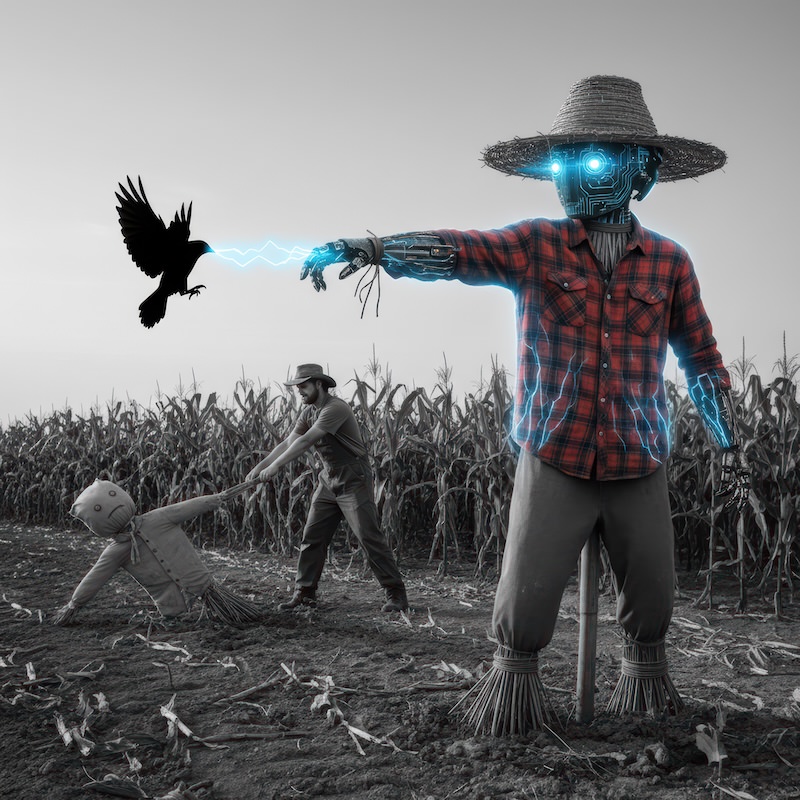Once upon a time, we thought gardeners had safe jobs. After all, what self-respecting machine would brave the weeds, wrestle with rose bushes, and deal with eccentric clients who want a “Zen-meets-English-cottage vibe” on a shoestring budget?
Then came the solar-powered weeding robot, intelligent drip irrigation, and – no joke – the laser scarecrow. Yes, even our quiet green sanctuaries are under siege from artificial intelligence. As the Financial Times recently pointed out in one breath (“gardening is probably the safest job”), it also followed up with a piece titled The Gardens That AI Grew. Ouch.
Jobs are like gardens
Before you throw your phone into the compost heap, let’s take a breath. The truth is, jobs aren’t monoliths. They’re bundles of tasks. And while machines are getting better at doing some of them (often the ones we hated anyway), that doesn’t mean the whole job disappears.
Think of a job like a garden. From a distance, it might just look like “gardening.” But anyone who’s actually done it knows that’s like saying “marriage is just about remembering your wedding anniversary.” And you do remember your anniversary date, right?
A garden isn’t one task. It’s a hundred different ones: planning, digging, planting, pruning, mulching, diagnosing fungi, chasing possums, and politely responding to that neighbour who thinks your lemon tree is blocking their solar panels.
Now, say a robot comes along that can do the weeding. Great! That doesn’t mean the job of gardening disappears. It just means you spend less time hunched over crabgrass and more time shaping hedges into dolphins (or whatever floats your horticultural boat).
This isn’t new. Generative AI may be the latest buzz, but the question it raises is old: What happens when machines take over parts of a job?
Take airline pilots. Over the years, autopilot systems have taken over large swathes of the actual flying. But rather than becoming redundant, pilots have become more like systems managers and emergency tacticians. When things go wrong (and occasionally, they do), you want Captain Sullenberger at the controls, not Siri. Technology here has made the job more interesting, not less. Fewer knobs, more judgement.
Contrast that with the fast-food fry cook. Enter the automated deep fryer: drop in frozen chips, press a button, walk away. The role has gone from craftsmanship (timing, texture, salt finesse) to button-pushing monotony. The human becomes the backup plan in case the machine runs out of oil (or has an existential crisis mid-shift). Lesson? It’s not about the tech; it’s about the context and our ability to adapt.
Is your job about to get better – or worse?
MIT economists David Autor and Neil Thompson have done the maths. They looked at two types of clerks: inventory and accounting. Both used to rely on repetitive tasks like basic maths and record-keeping, which are the kinds of things computers now do in milliseconds.
But here’s the kicker: while inventory clerk wages dropped, accounting clerk wages rose.
Why? Because when AI stripped away the rote stuff, accounting still required judgement, nuance, and interpretation. Inventory? Not so much. Strip away the numbers, and you’re left stacking boxes.
Is AI coming for the thinking part of your job, or just the bits you hate?
If it’s the latter, congratulations: your job might actually become more enjoyable. If it’s the former… well, time to pivot, rethink, or upskill. Or, to quote the ever-insightful futurist Alvin Toffler: “The illiterate of the 21st century won’t be those who can’t read and write, but those who can’t learn, unlearn, and relearn.’
Brainstormers, bureaucrats … and the bloke with the secateurs
Generative AI is brilliant at brainstorming. It connects ideas faster than a pub full of philosophers. If your job involves bursts of creativity amidst soul-sucking admin, then ChatGPT and its ilk might be the miracle you’ve been waiting for.
But if those brainstorming sessions are your only reprieve from otherwise menial drudgery… buckle up. You might be handing over the only part of your job you actually like. And for that gardener? Maybe the robot weeders aren’t the enemy. The real liberation could be an AI assistant that helps draft those painfully formal client emails. Finally – you can get back to pruning the bonsai instead of stressing over grammar.
Don’t let the old man in
So, here’s your challenge, gentlemen: AI isn’t here to replace you. It’s here to reveal you – to create space for you to demonstrate value in the unique, irreplaceable mix of experience, judgement, humour, and grit that no algorithm can replicate. This isn’t about coding bootcamps or trying to become a 55-year-old TikTok influencer. It’s about curiosity. Adaptability. And yes, maybe finally embracing that online course you’ve been ignoring.
The machines are coming. But so what? They can’t laugh. They can’t give meaning. That’s our job. Keep learning. Keep evolving. Keep showing up.
